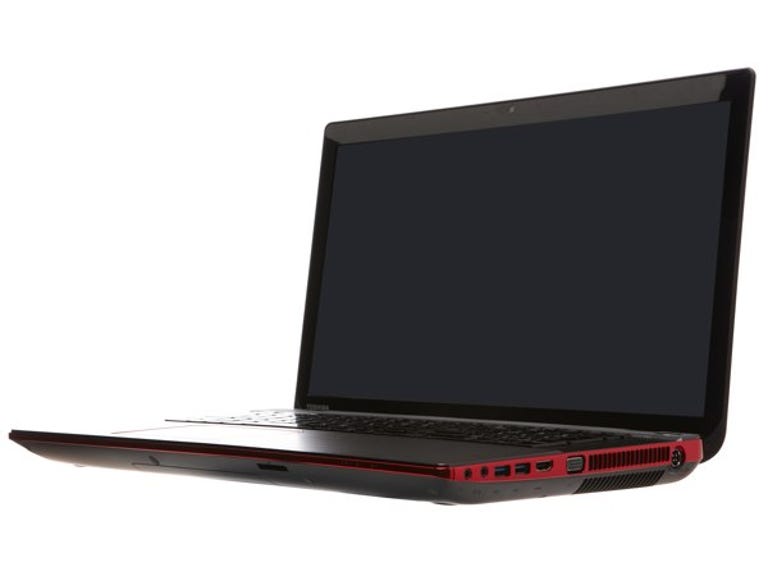 Why You Can Trust CNET
Why You Can Trust CNET Toshiba Qosmio X70 review: Toshiba Qosmio X70
Toshiba's multimedia slab gets the Haswell treatment, along with a new Nvidia GPU thrown into the mix.
This 17.3-inch behemoth might not look very different to the last Qosmio, but you'll notice the improvements as soon as you fire up some of today's games. While the exterior retains the solid, chunky chassis of the popular Qosmio, Toshiba has given the interior a thorough overhaul, decking it out with some of the finest new gaming components available.
The Good
The Bad
The Bottom Line
Design and features
The X70-A014 looks and feels much like its predecessor, clad in the same huge aluminium and plastic chassis that gamers have grown to know and love over the last couple of years. It's unmistakably a gaming machine, with the bold red and grey colours delivering a striking finish. Weighing in at a chunky 3.5kg, it's actually not too heavy for a 17-incher, at just half a kilogram more than some 15-inch gamers.
The full-sized, backlit keyboard feels rock solid, and the responsive touch pad is one of the better gaming pads we've used, though owners will obviously prefer to bring along their favourite headshot-enhancing mouse. Given the large screen, we were a little concerned that the HD resolution of 1920x1080 might not be quite high enough, but were relieved to see that the pixel structure was very hard to notice, even at extremely close range. If only the screen wasn't coated in an annoying glossy finish, which serves as a mirror in all but the darkest conditions. Toshiba has fitted the audio system with four Harmon Kardon speakers, and they deliver a surprisingly clear sound scape that doesn't suffer from the tinny problem that most laptops endure.
Connections, performance and battery
Given the large dimensions of this brute, there's plenty of room for inputs and outputs, and the Qosmio comes packed to the rafters with ways to plug devices in. All four USB ports are of the latest 3.0 standard, while Ethernet delivers gigabit connectivity. This port sits right next to the Blu-ray burner, perfect for a spot of disk-based movie viewing. Microphone in and headphone out sit on the right side of the chassis, alongside the HDMI and VGA ports. The rear is surprisingly clear of any ports, yet it doesn't feature any vents, either, with the Qosmio instead venting to the sides. We expected this to result in more obvious fan noise, yet the Qosmio delivered one of the lowest sound meter readings we've seen from a gaming laptop, showing just how cool the new products from Intel and Nvidia run when they're in the right case.
Diving into the specs, we see Intel's shiny new quad-core Hyper-Threaded Core i7 4700MQ processor at the heart of the system, with a maximum turbo speed of 3.4GHz. That's plenty of oomph for today's games, and is mated perfectly with Nvidia's new GTX 770M GPU, a mid-range part that goes a long way toward explaining the AU$3000 price tag. Sixteen gigs of DDR3 memory is the de facto standard for gaming laptops, while twin 1TB drives provide plenty of storage space, albeit at positively archaic speeds, despite one of the drives packing an 8GB SSD cache.
Given the excellent hardware specifications, we were a little surprised to see the Qosmio still struggle with the likes of Metro Last Light on Ultra detail, averaging just 14 frames per second. It appears that the most demanding games are still out of reach of laptops unless you're packing the absolute cream of the crop in CPUs and GPUs. Thankfully, the other benchmark results were much more impressive, with the Qosmio showing smooth performance in all.
We're used to gaming laptops blazing through batteries like a Tassie devil discovering a fresh lamb roast, but the Qosmio managed to exceed our expectations by dying just 63 minutes into the PowerMark benchmark. This is not a machine that can live without a power point nearby.
Choose a benchmark: 3DMark 2013 | Tomb Raider | Hitman Absolution | Metro: Last Light
Conclusion
Toshiba has delivered a very well thought-out package in the latest iteration of the Qosmio. We're struggling to fault a single choice in the build, with all of the components the perfect match. The only weakness in our sample was the choice of mechanical drives over SSD, but this can be resolved come buying time, installing a larger SSD as an optional upgrade. Overall, it's an excellent system for the price, perfect for both gaming and multimedia use.


